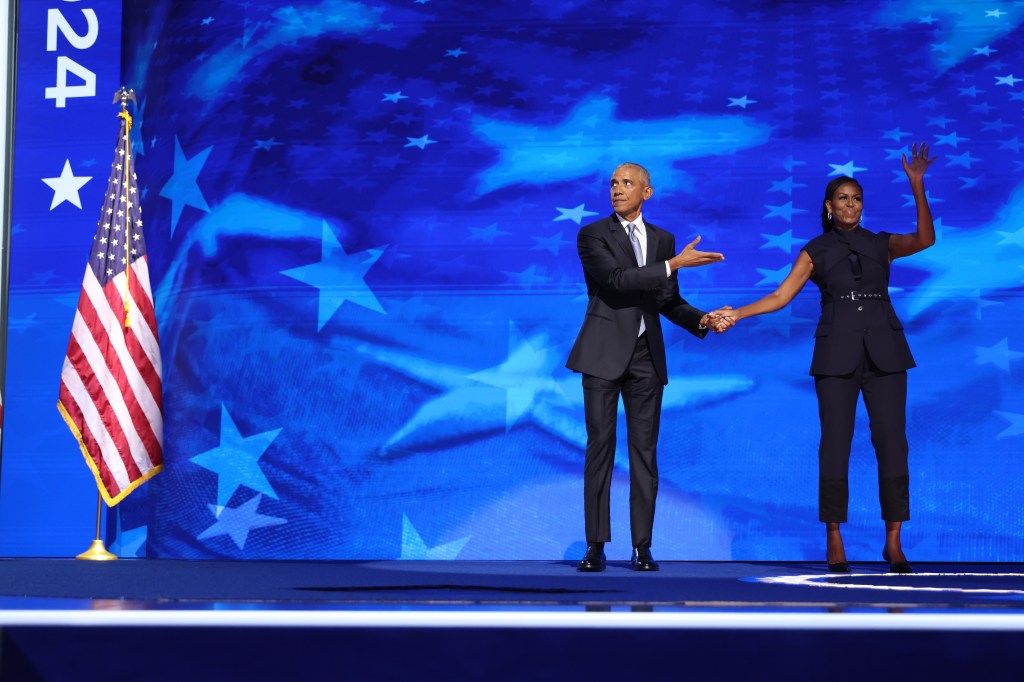Harkening back to their recurring themes of hope and unity, former President Barack Obama and first lady Michelle Obama closed the second night of the Democratic National Convention with back-to-back speeches: one to rally the troops and the other to urge a return to civility.
“America, hope is making a comeback!” Michelle Obama declared at the top of her address, bringing the crowd to its feet.
And she ripped former President Donald Trump, claiming he felt “threatened by the existence of two hardworking, highly educated, successful people who also happened to be Black. Who’s going to tell him that the job he’s currently seeking might just be one of those Black jobs?”
In a 20-minute speech, the former first lady talked about her mother, Marian Robinson, a South Side native who died in late May. Barack Obama, too, honored Robinson as “funny and wise and the least pretentious person I knew.”
Robinson “believed that all children — all people — have value, that anyone can succeed if given the opportunity,” Michelle Obama said, going on to say Vice President Kamala Harris shared their values. She praised Harris as “one of the most qualified” people to ever seek the presidency and “the embodiment of the stories we tell ourselves about this country.”
Michelle Obama also took several jabs at Trump before naming him, saying Harris did not “benefit from the affirmative action of generational wealth,” and understood “if we bankrupt a business… we don’t get a second, third, or fourth chance… If we see a mountain in front of us, we don’t expect there to be an escalator waiting to take us to the top.”
As Democrats considered other potential presidential nominees, her name often emerged as the most popular. She warned against letting any missteps, bad polling, or lies that “take hold” derail the push to elect Harris president and Gov. Tim Walz vice president.
“We will not indulge our anxieties about whether this country will elect someone like Kamala instead of doing everything we can to get someone like Kamala elected,” Michelle Obama said.
Barack Obama used the first moments of his closing speech to thank his former vice president, Joe Biden, who he described as a “brother” and “friend” who navigated the pandemic and led “the world’s strongest recovery,” and “defended democracy at a moment of great danger.”
Several reports cited Biden’s “lingering frustration” with allies, including Obama, in the days following Biden’s poor debate performance against Trump. Biden spoke Monday, but is not attending the rest of the week’s festivities.
Nodding to the passing of the torch to Harris, Obama also took his shots at Trump, including his “weird obsession with crowd size.”
He did stop the United Center crowd, at one point, from booing after mentioning Trump “killed a bipartisan immigration deal” — an early nod to his address’ theme of civility.
A “sense of mutual respect has to be part of our message. Our politics has become so polarized these days that all of us, across the political spectrum, seem quick to assume the worst in others unless they agree with us on every single issue… after a while, regular folks just tune out, or they don’t bother to vote,” he said. That kind of polarization “won’t work for us,” he said, encouraging fellow democrats to listen to the concerns of voters on the fence.
“Our fellow citizens deserve the same grace we hope they’ll extend to us,” he said.
He praised Harris’ career as a prosecutor and California’s Attorney General standing up “for children who had been victims of sexual abuse,” fighting “big banks and for-profit colleges,” and pushing the Obama administration to make sure homeowners received a fair settlement during the mortgage crisis.
Amid some criticism that Harris had not come forward with policy proposals in the early weeks of her campaign, Obama also highlighted her plans for housing, limiting out-of-pocket healthcare costs, and putting “a college degree within reach of more Americans” while allowing skilled workers without degrees access to government work.
But “as much as any policy or program,” the country yearns for “a return to an America where we work together and look out for each other,” or what President Abraham Lincoln called “our bonds of affection,” Obama said.
Tuesday’s speech was not only a return to the convention podium — a stop he’s made multiple times since 2004 — it was a return to his political home. Obama moved to Chicago in the mid-1980s, working as a community organizer on the far South Side, a summer associate at local law firms and a constitutional law instructor at the University of Chicago. A Hyde Parker, he was elected to the Illinois Senate in 1996 and made his first attempt at national office in 2000, a failed congressional race against Rep. Bobby Rush.
He rebounded four years later in the race for the U.S. Senate. After emerging from a crowded primary, Obama was poised to become the Senate’s only Black member with a November win when he was tapped to give the keynote Democratic National Convention speech in 2004. His “audacity of hope” speech helped catapult him to national prominence and a successful run for president four years later.
Originally Published:






































